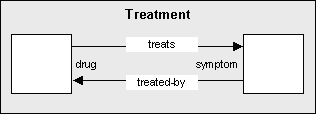An ontology is a model of a domain of knowledge, describing the concepts within the domain and the relationships between concepts in the domain.
The purpose of an ontology is to model a domain of knowledge, such as
The building blocks of an ontology are concepts. Concepts are abstract representations of the fundamental things you are modelling in your domain. For example, in the ontology of medical knowledge our concepts may be antibiotics, ulcers, aspirin, etc.
The power of the ontology is realised through associations. Associations define binary relationships between concepts. For example we may say that drugs are related to symptoms, in that the former treat the latter. In this definition of an association drug and symptom are called roles. We can show this association definition using a simple diagram:

Once we've defined an association in this way we can define actual instances of the association. These are called links. Here is an example:

Here are some more examples in a shorthand notation:
 Headache
Headache Fever
Fever Bacterial Diseases
Bacterial Diseases Itching
Itching Stomach Ulcer
Stomach Ulcer Disprin
Disprin